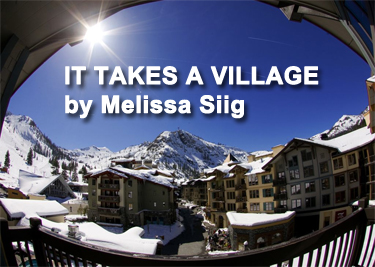ESPN & X Games Writer, Melissa Siig, hears it from both side of the Squaw Valley Development Issue
by Melissa Siig
Squaw Valley Village, Calif.,'s new expansion project, which covers 100 acres adjacent to the existing village, would quadruple the number of residential and tourist accommodation units at the ski area's base. The expansion is part of a long-term overhaul Squaw's new owner, KSL Capital Partners, have dubbed "The Renaissance," which also includes some $70 million in improvements to both Squaw and neighboring Alpine Meadows by 2016.
The new village, which is to be built over 12 to 15 years in four phases, calls for 1,300 condominium and hotel units, 29,000 square feet of commercial space and restaurants, and a 132,000-square-foot Mountain Adventure and Aquatic Center. The center would house water slides, a lazy river, a surfing simulator, a ropes course, a zip line, rock climbing, and an arcade. Plans for a bobsled-like coaster called the Timberline Twister, although not part of the village project, are also in the works.
The project has some local residents concerned. "The character of Squaw would change tremendously if this is built, it would be a completely different place," said Judy Carini, a 37-year Squaw Valley resident. "We would have traffic all the time."
The proposed expansion plan would be built over the next 12 to 15 years.
So concerned are Carini and other Squaw homeowners about the project that they recently formed the Friends of Squaw Valley, whose mission is to advocate for "environmentally sustainable, economically viable, and aesthetically compatible development in Squaw Valley while preserving its community character." Members of the group announced its formation at a packed community meeting last Thursday where the project was being discussed.
Some residents are worried about Squaw's plans to do away with the members' locker room and alter day skier parking. "I am really worried they are changing this to a Disneyland resort with nothing for the locals," said Ed Heneveld, a doctor who has lived in Squaw Valley for more than 30 years.
Squaw says its goal is to transition away from day skiers to destination skiers, which resort officials say is necessary to reduce traffic. "Almost every skier experience involves a car; everyone comes in the morning and leaves in the afternoon," said Chevis Hosea, vice president of development for Squaw Valley Real Estate LLC, which is owned by KSL Capital Partners, Squaw's owner since 2010. "This will smooth traffic flows."
Squaw also hopes the project will turn the ski area into a year-round destination resort, which they say will make the village -- which has struggled in the summer months -- into an economically viable one.


More like "Ask me no questions, I'll tell you no lies little people. Capital has moved to town, and we bought city hall". Time to focus on other activities that offer
the freedom and exhiliration that we USED to get from skiing.